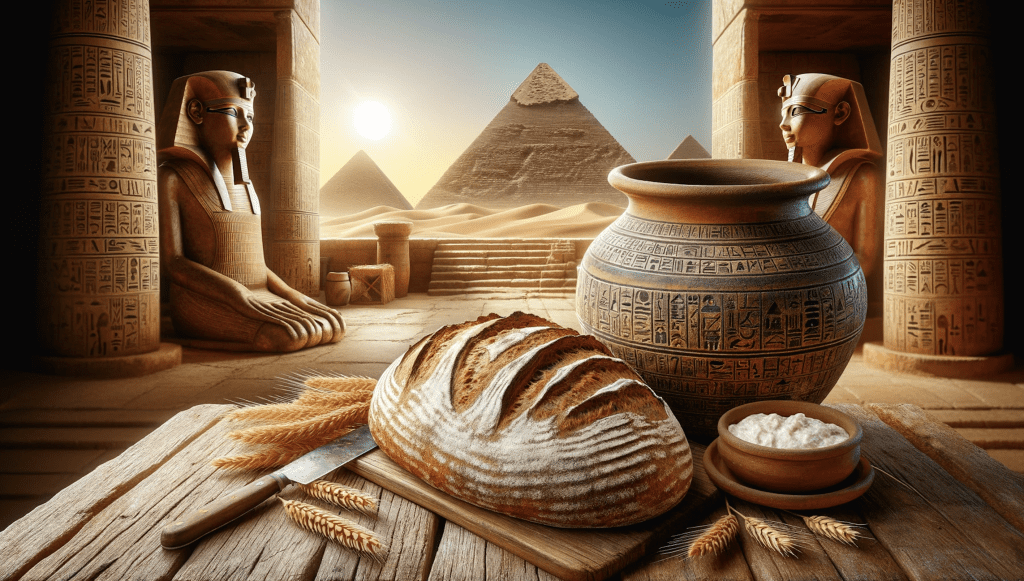In Calgary Alberta, a city known for its vibrant culinary scene, a remarkable discovery has taken place. Vivian Woods, a local entrepreneur, has brought to light a sourdough starter with a lineage that traces back to the time of the ancient Egyptian pyramids, around 4,500 years ago. This sourdough starter is not just a baking ingredient; it’s a living link to our past, offering a unique glimpse into the culinary practices of one of the world’s oldest civilizations.
The Historical Significance of Sourdough in Ancient Egypt
Sourdough bread, known for its tangy flavor and chewy texture, has been a staple in human diets for thousands of years. In ancient Egypt, the art of bread-making was highly developed, and sourdough was an essential part of their diet. The Egyptians are credited with the discovery of natural fermentation, which occurs when wild yeast and bacteria in flour mix with water and start to ferment, giving sourdough its distinctive taste.
The sourdough starter discovered by Vivian Woods is believed to have originated from clay pots used in these ancient Egyptian bakeries. These pots contained the dried remnants of the original sourdough culture, which included wild yeast and lactobacilli bacteria. When archaeologists uncovered these pots, they were able to extract and reactivate the dormant microorganisms, thereby resurrecting a piece of culinary history.
The Science Behind Sourdough Fermentation
Sourdough fermentation is a complex biochemical process involving the symbiotic relationship between yeast and lactic acid bacteria. The yeast in the starter consumes the sugars in the flour, producing carbon dioxide gas and alcohol. This gas creates the bubbles in the dough, leading to its rise. Meanwhile, the lactic acid bacteria produce acids that give sourdough its characteristic tangy flavor.
The ancient Egyptian sourdough starter is particularly potent due to its age and the unique strains of yeast and bacteria it contains. These microorganisms have adapted and evolved over thousands of years, resulting in a starter that is highly active and imparts a distinctive flavor profile to the bread.
The Journey from Ancient Egypt to Modern-Day Calgary
The path this ancient sourdough starter took to reach Calgary is a testament to the interconnectedness of our world. After being reactivated, the starter made its way to Idaho, where two individuals involved in the original Egyptian project resided. Vivian Woods acquired the starter from these individuals, bringing a piece of ancient culinary history to Calgary.
In her bakery Jan’s Creative Temptations, Jan Woods, Vivian’s mother, has been experimenting with this unique ingredient. She notes that the ancient starter is much more potent than modern starters, leading to a more active fermentation process and a bread with a pronounced sour flavor. This is due to the mature nature of the starter, which has a higher concentration of wild yeast and bacteria.
Preserving and Sharing the Legacy of the Ancient Sourdough Starter
Vivian Woods is committed to preserving the legacy of this ancient sourdough starter. She sells it in liquid form locally in Calgary, allowing other baking enthusiasts to experience the unique flavors of ancient Egypt in their own kitchens. For those beyond Calgary, a dehydrated version of the starter is available, which can be shipped globally.
This sourdough starter is not just a culinary ingredient; it’s a living piece of history. By sharing it with the world, Vivian Woods is helping to keep the ancient art of sourdough bread-making alive and allowing people to connect with their culinary heritage in a tangible way.
The Timeless Appeal of Sourdough Bread
The discovery of the ancient Egyptian sourdough starter in Calgary is a reminder of the enduring nature of sourdough bread. As this ancient yeast breathes life into modern loaves, it serves as a testament to the skill and ingenuity of our ancestors. For those interested in experiencing this unique taste of history, Vivian Woods offers an opportunity to incorporate a piece of the ancient world into contemporary cuisine.





















